Desperate times call for desperate measures. There’s nothing quite like a perfectly light, chewy, and crispy traditional pizza crust made with yeast, but right now we have to make do with what we’ve got and for many, yeast is hard to come by! And I don’t know about you, but I’m definitely not going to give up my beloved pizza just because I can’t find any yeast at the store. 😅So for the time being I’m making this super fast and easy No-Yeast Pizza Dough to get my fix. Make sure you scroll down and read about the differences between yeast and no-yeast dough to get a better idea if this type of dough will work for you!
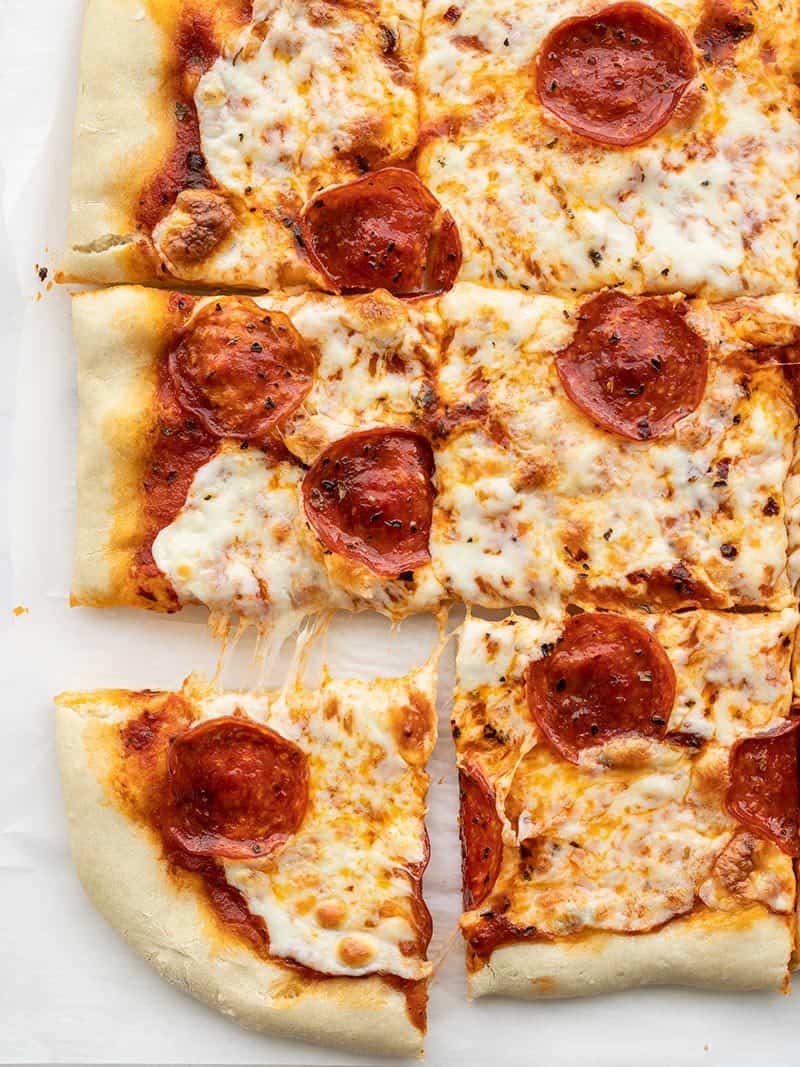
All recipes are rigorously tested in our Nashville Test Kitchen to ensure they are easy, affordable, and delicious.
What is No Yeast Pizza Dough Like?
It’s important to understand that no-yeast pizza dough is not exactly like a traditional pizza dough made with yeast. No-yeast pizza dough does not go through a lot of kneading and rising, so it has a softer, fluffier, less chewy, and more bread-like texture. It’s not super crispy, it does not make those big delicate bubbles on the edges, and it doesn’t get very brown. It kind of reminds me of the old-school Dominos crust before they revamped their recipe, or some of the thicker-crust frozen pizzas. So, if you are a fan of either of those types of crusts, you might like this one as well!
Looking for a more traditional pizza dough recipe? Check out my classic Homemade Pizza Dough or Thin & Crispy Pizza Crust.
How Does No Yeast Pizza Dough Rise?
Instead of gas bubbles produced by live yeast, this pizza dough rises through gas bubbles produced by baking powder. Baking powder requires both water and heat to react, so you won’t see this dough rising as it sits at room temperature. That’s one of the great benefits of this no-yeast pizza dough—there’s no need to sit and wait for it to rise. Once it goes into the hot oven, then it springs into action!
Should I Hand Stretch or Roll Out the Dough?
As with most pizza doughs, using a rolling pin is a little easier, but it does create a flatter, more dense baked crust. If you gently stretch the dough by hand, more of the air bubbles are preserved in the dough and you’ll get a slightly more airy crust. So, take your pick based on your preferences!
What Kind of Pan Should I Use?
I baked the pizza below on a sheet pan lined with parchment because on this day I was favoring convenience over texture. A parchment lined sheet pan produces a softer bottom crust, but makes cleanup super easy. If you bake on a perforated pizza pan or a pre-heated pizza stone, you’ll get a crispier bottom crust, but you’ll need to take extra care to prevent the dough from sticking (a good dusting of flour or cornmeal under the dough).
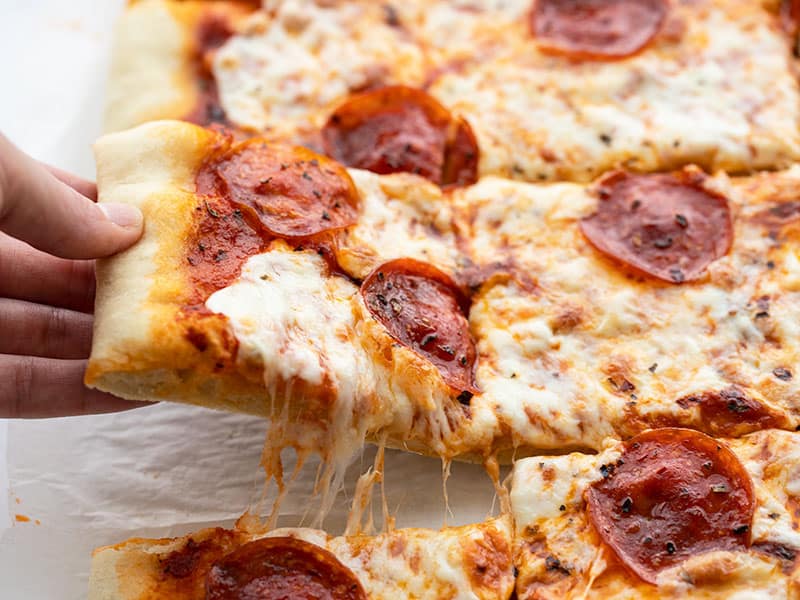
Want some pizza topping ideas? Try my White Pizza with Parsley Pesto Drizzle, Eggs Florentine Breakfast Pizza, or Garlicky Kale and Ricotta Pizza.
No-Yeast Pizza Dough

Ingredients
- 2 cups all-purpose flour ($0.61)
- 1 Tbsp baking powder ($0.12)
- 3/4 tsp salt ($0.03)
- 1 Tbsp olive oil ($0.16)
- 1 cup water ($0.00)
Instructions
- Preheat the oven to 425ºF. In a large bowl, stir together the flour, baking powder, and salt.
- Add the olive oil to the water, then pour them both into the bowl with the dry ingredients. Stir until a shaggy ball of dough forms and no more dry flour remains on the bottom of the bowl. If the dough does not come together in one piece or there is still dry flour in the bowl, add a small amount of water (1 Tbsp at a time) until the dough comes together.
- Turn the dough out onto a clean, lightly floured surface and knead just a few times, or until the dough feels evenly mixed (no hard or dry pieces). Let the dough rest for about 5 minutes to relax the gluten.
- Stretch or roll the dough out into your desired shape, making sure not to stretch it to less than ¼-inch thick.
- Place the dough on your preferred pan (prepared with either parchment or a good dusting of cornmeal or flour), then top the pizza with your favorite sauce and toppings. Bake the pizza for about 15 minutes, or until the cheese is melted and slightly browned on top. Slice and serve immediately.
See how we calculate recipe costs here.
Equipment
- Splatterware Sheet Pan
- Parchment Paper
- Rolling Pin
- Liquid Measuring Cup
Notes
Nutrition
Scroll down for the step by step photos!
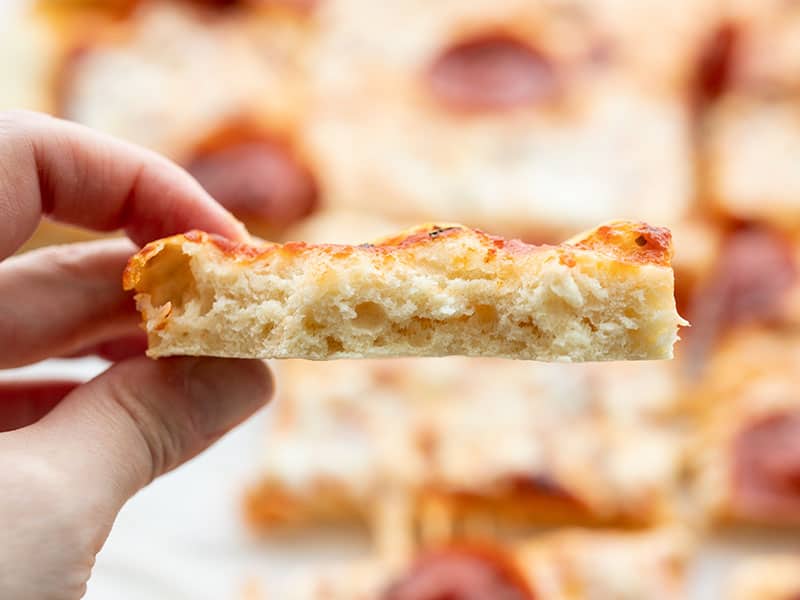
I thought you might like an inside look at the texture of this no-yeast pizza!
How to Make Pizza Dough Without Yeast – Step by Step Photos
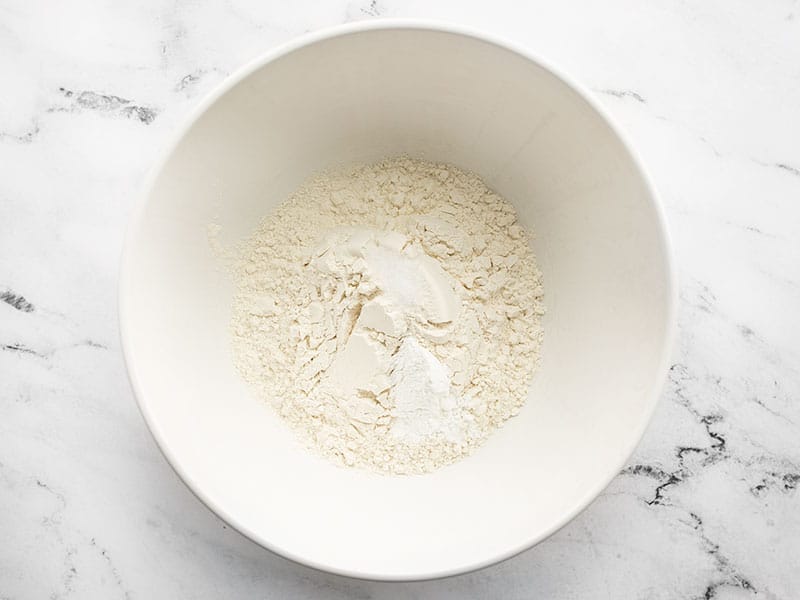
Preheat the oven to 425ºF. Add 2 cups all-purpose flour, 1 Tbsp baking powder, and ¾ tsp salt to a large bowl. Stir until these ingredients are well combined.
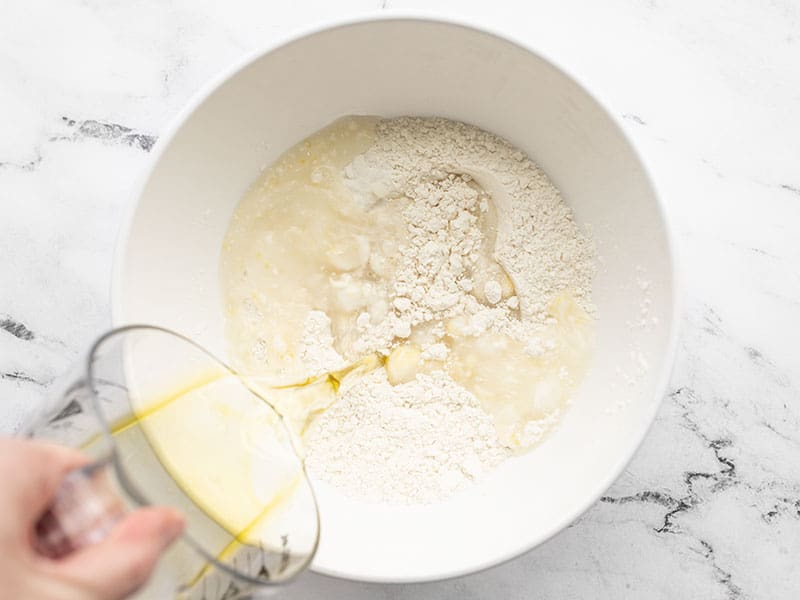
Add 1 Tbsp olive oil to 1 cup water, then pour them into the bowl of dry ingredients.
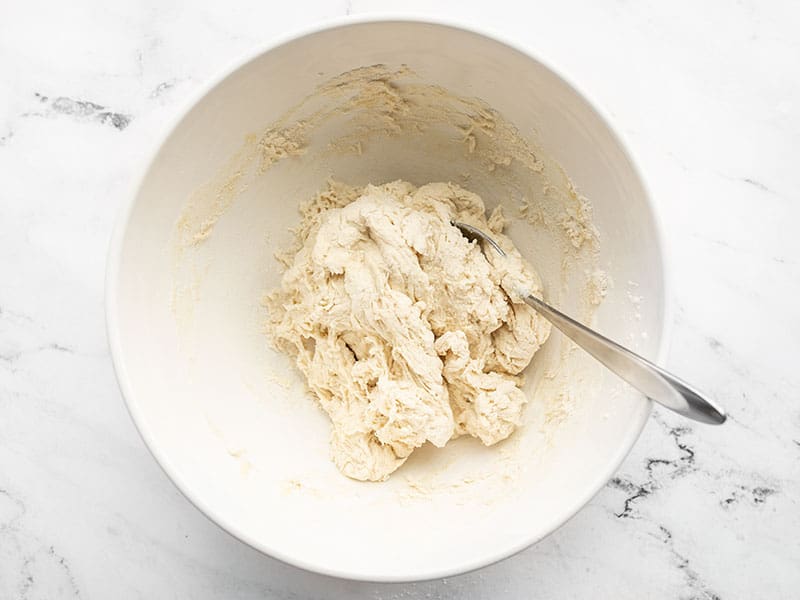
Stir the ingredients together until they form a shaggy ball of dough and no more dry flour remains on the bottom of the bowl. If the dough is too dry and does not come together in one piece or there is a lot of flour left on the bottom of the bowl, add a little more water (1 Tbsp at a time), until the dough comes together.
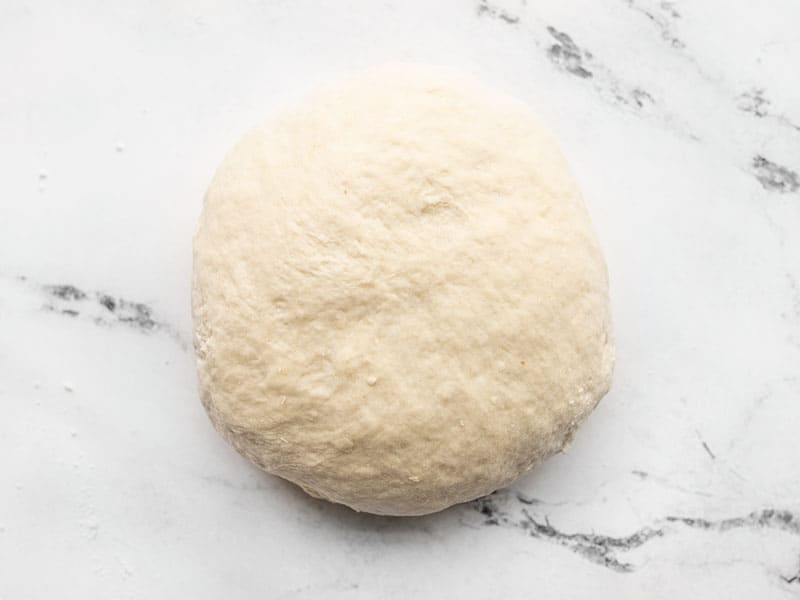
Turn the dough out onto a clean, lightly floured surface and knead just a few times until the dough feels evenly mixed (no hard or dry pieces). Let the dough rest for about 5 minutes so the gluten relaxes, which makes it easier to roll or stretch out.
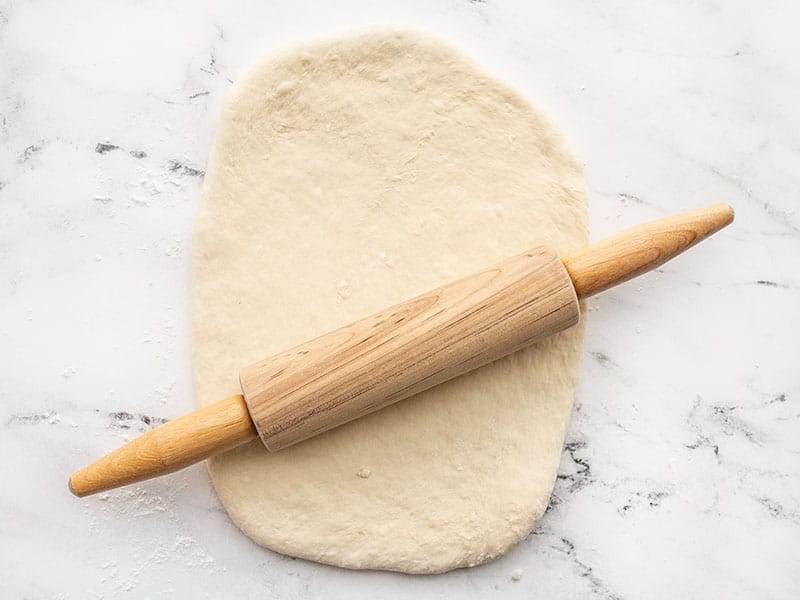
Roll or stretch your dough out to the desired shape or size, making sure not to stretch it to less than ¼-inch thick. Remember, while rolling is easier, it produces a flatter slightly more dense dough. Stretching makes a slightly lighter, fluffier crust. I rolled my dough about half way, then hand stretched the rest of the way.
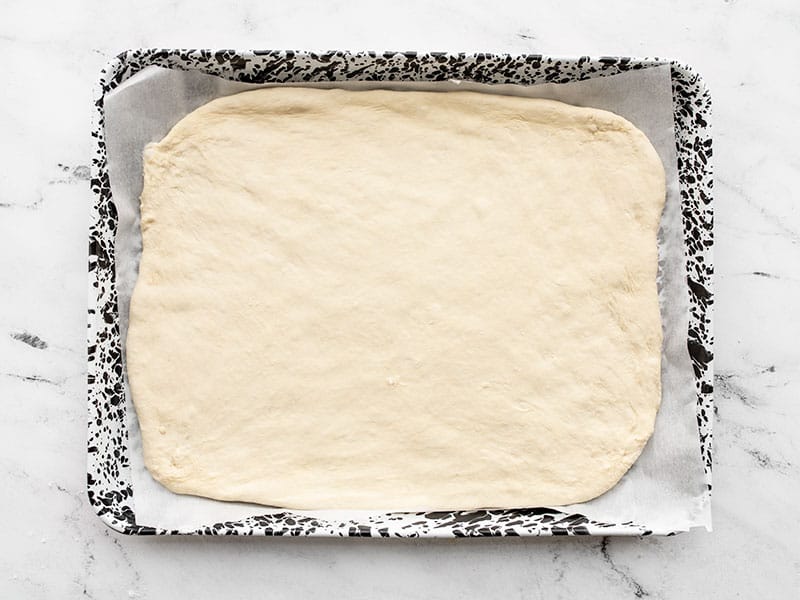
Transfer your dough to your preferred type of pan (notes on the results you’ll get from different pans is above the recipe). I used a parchment-lined sheet pan, which will result in a softer bottom crust, but is waaaaay easier to clean up.
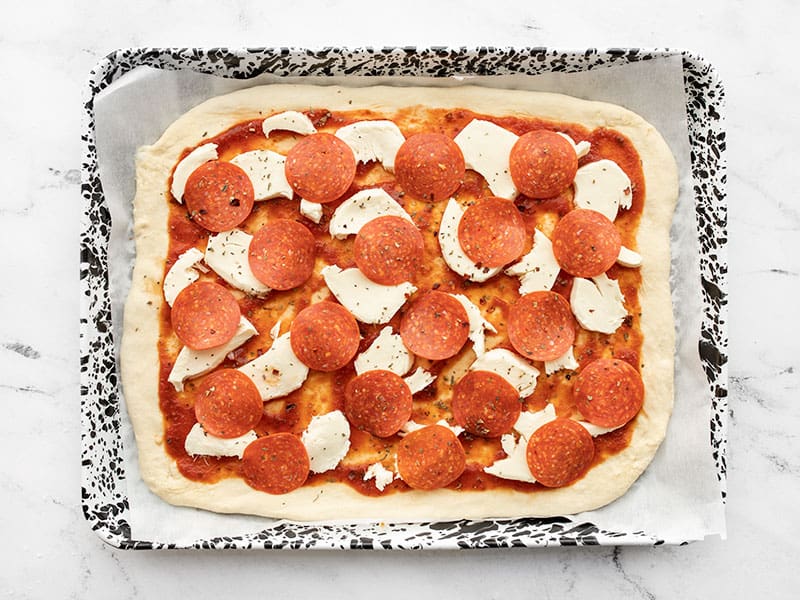
Add your preferred sauce and toppings (Homemade Pizza Sauce, fresh mozzarella, pepperoni, dried oregano, and crushed red pepper in photo above).
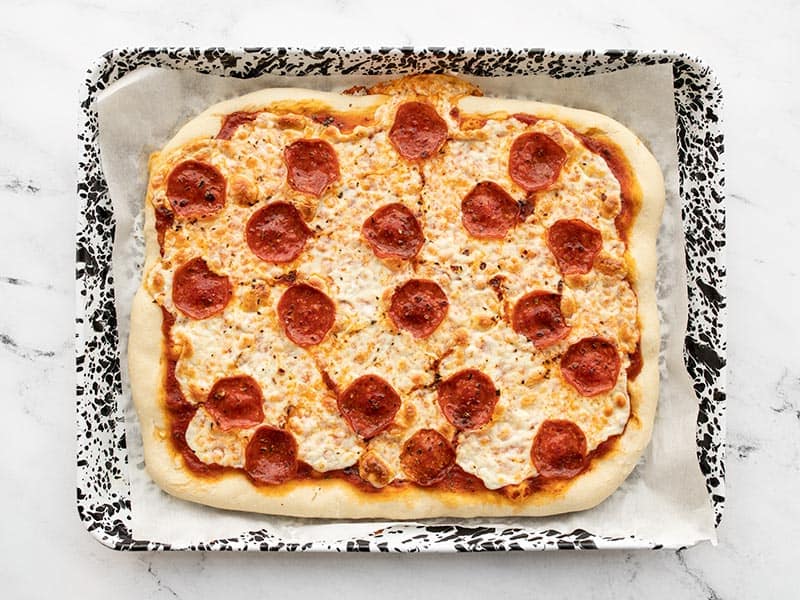
Bake your pizza for about 15 minutes, or until the cheese is melted and slightly browned on top.
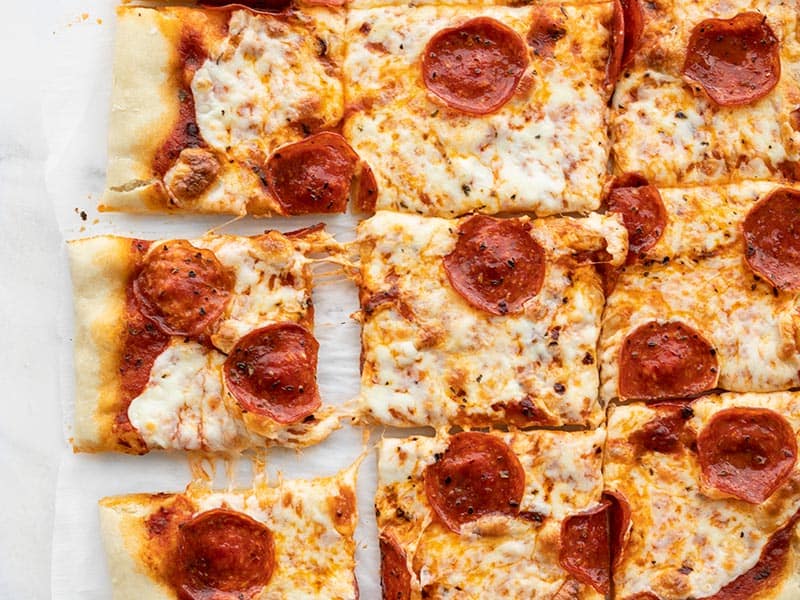
Slice and serve immediately! 🍕🍕🍕


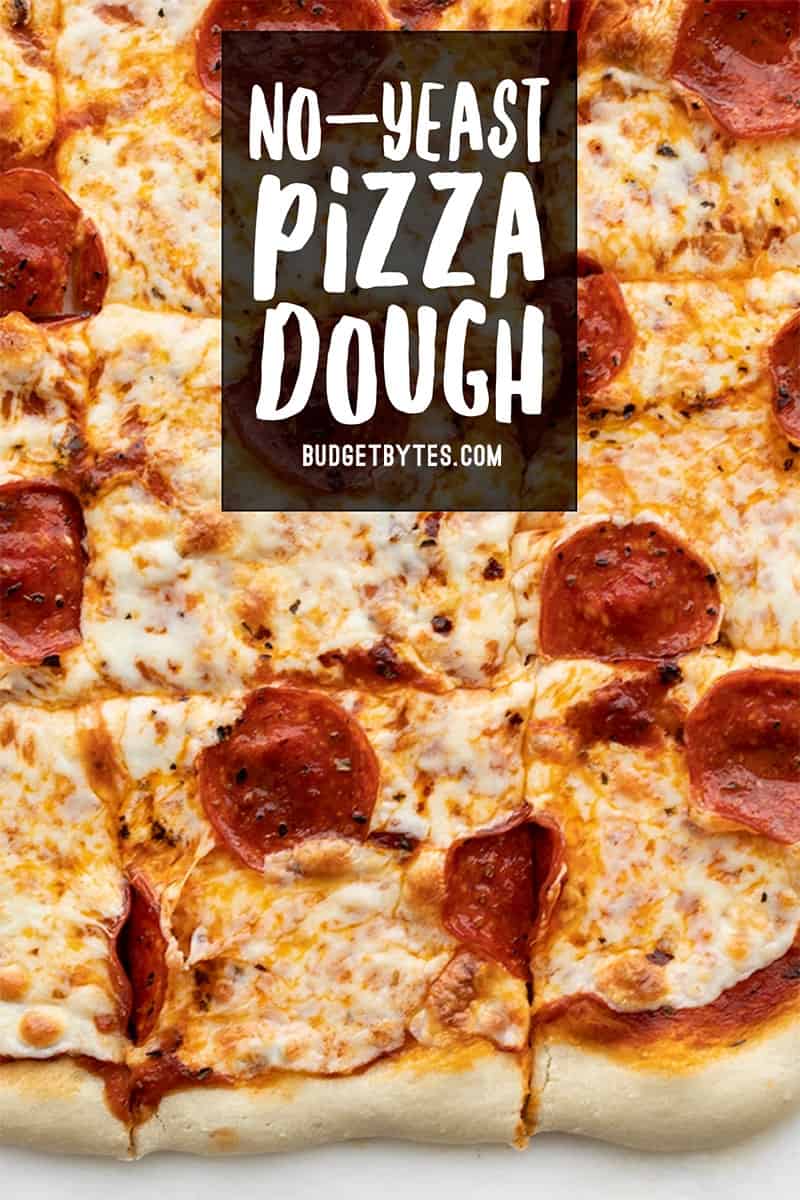
So the water ratio is off but a smart person can figure it out and add garlic to the top of the crust and olive oil for great taste. I liked that no yeast was needed! I’ll come back to make this dough again!
Was awesome! Like everyone else.. needed extra flour.. but perfect. Thanks so much👍😀
so easy and i love it
Can you freeze this dough for later? Or, is it better to cook it then freeze it?
I would freeze the dough before baking.
The dough was very soft so I added extra flour and a little less of the water mixture. I added a little garlic powder and oregano, which helped boost the flavor. If you’re looking for a crispy crust, this is not your recipe however, it is very good and everyone loves them. We made individual Pizzas and had fun.
My crust ended up tasting like play doh. Any suggestions on how to fix that? I followed everyrhing but the actual making pizza part, made cheesy garlic bread instead.
It’s possible that you’re just sensitive to the taste of the baking powder, as some people are!
Thank you. The crust was great and you were a lifesaver. We planned on using Stonefire crust, but when we opened them, they were moldy and we didn’t have yeast.
Thank you. The crust was great and you were a lifesaver. We planned on using Stonefire crust, but when we opened them, they were moldy
This crust was so easy and very surprisingly good!! I had to add more flour also but that was an easy fix while I was kneading it!
Thanks for sharing! Perfect for no yeast dough
So, yeah this was a mess start to finish. I haven’t baked it yet but I really hope it tastes better than I’m assuming it will after the hellfire of a time I had to make those ratios work. Next time I’m going to the food network website
So unfortunately I’m with the consensus that the ratios for this recipe are off. I made this for family dinner and had to add a lot more flour like others have commented. It also had an odd flavor to me which I’m thinking may have been the baking powder. I’m not really a fan of this recipe as is but feel it’s easy to tweak now that I’ve tried it. It seems it would be easier to start with the 2 cups of flour then just add the water a little at a time while stirring. Adding as directed with a whole cup of water resulted in a soupy dough requiring a lot more flour and work to become kneadable. Fortunately I had gloves to knead but a lot of it stuck to the gloves so the whole thing was a bit of a hassle even having sprayed them with oil because flouring them didn’t help. I’d also suggest baking the dough for a few minutes before adding the toppings/sauce for a less doughy crust in the end. This was definitely a learning experience for my first scratch-made pizza.
Im tweaking from readif these comments the pizza tasted like pizza and the portions were so confusing like what the fridge is a 1 cup
Thank you!
Something’s not right or I didn’t do something right. The crust is terribleeeeeeeeeee. Wayyyyyy too much baking powder. I’ll try again with less next time.
Good recipe!! I needed a base for naan for my Indian food! And this worked perfectly enough! Added olive oil while it was resting and pan fried it and it was really lovely! Will use again!